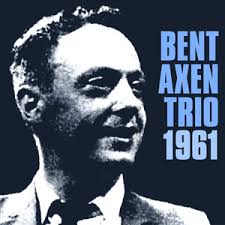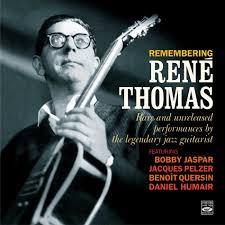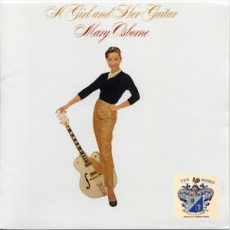
Daily Dose Of Jazz…
Bent Axen was born on August 12, 1925 in Copenhagen, Denmark.
Axen played for a year with Ib Renard in 1949 and in 1950 became a member of the Johnny Campbell and Max Brüel bands until 1958. He then moved on to work in Ib Glindemann’s orchestra. In 1960 he founded his own jazz quintet and also accompanied guest soloists such as Eric Dolphy in Erik Moseholm ‘s trio.
Between 1961 and 1967 he was a member of the radio jazz groups of Danmarks Radio, for which he also wrote compositions. He also performed with Don Byas. He went on to work as a theater musician and composer, first at Gladsaxe Teater and from 1971 at Folketeatret.
In 1960 he was honored as Danish “Jazz Musician of the Year”. Pianist, theatre and film composer Bent Axen, who released a half dozen albums as a leader, died on May 20, 2010.

Daily Dose Of Jazz…
Jørgen Ryg was born on August 11, 1927 in Copenhagen, Denmark and was the son of the opera singer and barber Evald Asger Ryg Kristiansen and the pianist Ellen Kirstine Ryg.
Over the course of his career Jørgen recorded several jazz albums but is best known for his comical monologues on stage. He appeared in 37 films between 1954 and 1978. He won the Bodil Award for Best Actor in a Supporting Role for his role as adjutant Mühlhauser in Lenin, You Rascal, You.
Ryg was diagnosed with throat cancer in 1979. He was declared healthy the following year, but suffered a severe relapse when he appeared in the Tivoli revue in the summer of 1981. He collapsed with a bleeding stomach ulcer and had to give up work for the rest of the season.
Trumpeter, composer, comedian and actor Jørgen Ryg, was admitted to the Finsensinstituttet in Copenhagen and died on August 28, 1981 at the age of 54.
More Posts: bandleader,history,instrumental,jazz,music,trumpet

Daily Dose Of Jazz…
Charlie Queener was born in Pineville, Kentucky on July 27, 1921 or 1923, the actual year of his birth is in question. During the Forties he worked with the Muggsy Spanier Orchestra, Harry James Orchestra, Benny Goodman Orchestra, Joe Marsala Orchestra, and Glen Gray among others.
Between 1946-50 Queener settled into Nick’s in New York and then spent much of his career freelancing with Dixieland all-stars. Among his associations were Bobby Hackett, Billy Butterfield, Jimmy McPartland, Ruby Braff, Max Kaminsky, Wingy Manone from 1954 to 1960, Wild Bill Davison and with Clarence Hutchenrider on and off from 1958 to 1973, to name a few.
He worked into the 1990s, also composed orchestral works starting in the mid-1960s but never led a record session of his own. Pianist Charlie Queener, who played in Dixieland, swing and mainstream settings, died in July 1997.
More Posts: history,instrumental,jazz,music,piano

Daily Dose Of Jazz…
Benoît Quersin was born in Brussels, Belgium on July 24, 1927 into a family with a classical tradition. He met personalities like the composer Béla Bartókor and the pianist Stefan Askenaseat at a very young age. Shortly before the war, he discovered jazz secretly in his bedroom while listening to the records of Fats Waller and Louis Armstrong, then Belgian jazz bandleader Fud Candrix.
His beginnings as a musician were with the kids in his Brussels neighborhood. At the Liberation, Quersin set up his first orchestra. In 1947 he hired Jean Thielemans, who later became known as Toots, with whom he played for some time. He abandoned the piano for the double bass and obtained his first engagements. Toots took him to the Paris, France festival at a time when the headliners were Charlie Parker and Miles Davis.
Moving to Paris in 1950 he played and recorded with Sidney Bechet, Lionel Hampton, Sarah Vaughan, Dizzy Gillespie, Chet Baker, Lucky Thompson, Zoot Sims, Lee Konitz, Jimmy Gourley, Blossom Dearie, Mary Lou Williams, Kenny Clarke, and Jonah Jones among others. The French musicians were Stéphane Grappelli, Maurice Vander, Barney Wilen, Henri Renaud, René Urtreger, Sacha Distel, and Martial Solal, the Belgians were René Thomas, Bobby Jaspar, Francy Boland, Leo Mouse, Jacques Pelzer, and Jack Sels.
Returning to Belgium in 1957 he opened a jazz club in Brussels, the Blue Note, where people like Lou Bennett, Jackie McLean, Martial Solalor and Marc Moulin. In 1961, Quersin became host of jazz programs on Belgium radio RTB and interviewed Charles Mingus, Thelonious Monk, Ray Charles, Fats Domino and John Coltrane. Late in life he became an ethno-musicologist, passionate about world civilizations and the music of West and Central Africa, and collected traditional music from the Mbam ethnic group inCameroon. He would go on tomove to Zaire, Democratic Reublic of Congo and release several albums of traditional instruments.
Double bassist Benoît Quersin, who was an important double bassist on the international jazz scene during the 1950s and Sixties, died on May 31, 1992 in Vaison-la-Romaine, France.
More Posts: bass,ethnomusicology,history,instrumental,jazz,music

Daily Dose Of Jazz…
Mary Osborne was born in Minot, North Dakota on July 17, 1921 into a musical family. As early as age three she showed an interest in music with her earliest instruments including piano, ukulele, violin, and banjo. At nine, she picked up the guitar. At ten, she started playing banjo in her father’s ragtime band. She was featured on her own radio program, performing twice weekly until she was fifteen. At twelve she started her own trio of girls to perform country music in Bismarck, North Dakota.
By the time she turned fifteen, Osborne joined a trio led by pianist Winifred McDonnell, for which she played guitar, double bass, and sang. After hearing Charlie Christian play electric guitar she immediately bought her own electric guitar and had a friend build an amplifier. She sat in with Christian to learn his style of guitar. Her husband and trumpeter Ralph Scaffidi encouraged her musical career.
The early 1940s saw Mary sitting in on jam sessions on 52nd Street, on the road with jazz violinist Joe Venuti and working freelance in Chicago, Illinois when she made a recording with Stuff Smith. In 1945, Osborne headlined a performance with Dizzy Gillespie, Art Tatum, Coleman Hawkins, and Thelonious Monk in Philadelphia, Pennsylvania to reviews and audiences that praised her specifically. She, Tatum, and Hawkins went on to record a concert in New Orleans.
Returning to New York City she recorded with Mary Lou Williams in 1945, Coleman Hawkins, Mercer Ellington, and Beryl Booker in 1946, and led her own swing trio. For three years her trio played 52nd street clubs, had a year-long engagement at Kelly’s Stables, and made several recordings. Throughout the 1950s, she played with Elliot Lawrence’s Quartet on The Jack Sterling Show, and appeared on the television show Arthur Godfrey’s Talent Scouts.
By the Sixties her focus changed to learning Spanish classical guitar under Alberto Valdez-Blaine and incorporated pick-less playing into her jazz playing. Osborne moved to Bakersfield, California, where she lived the rest of her life, and founded the Osborne Guitar Company with her husband. Mary taught music and continued to play jazz locally and in Los Angeles, California as well as several jazz festivals over the next two decades.
Guitarist Mary Osborne died on March 4, 1992 at the age of 70, the result of chronic leukemia.
More Posts: bandleader,guitar,history,instrumental,jazz,music



